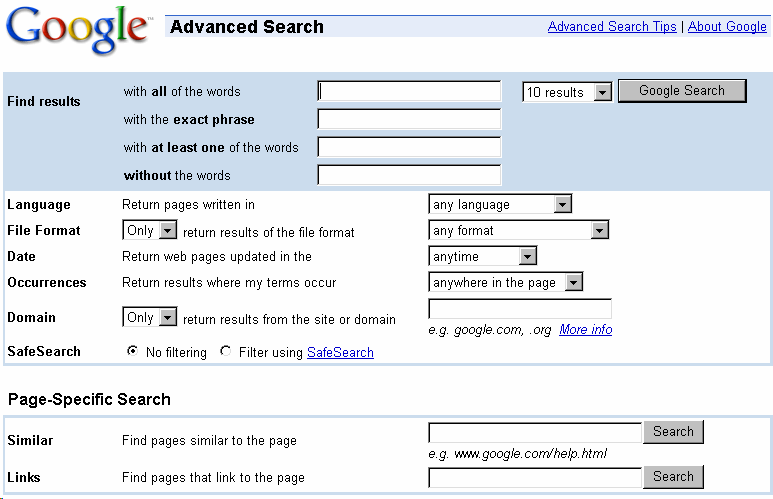
Google is not the only search engine on the web, but it is the most popular. Some alternatives are:
www.yahoo.com - older than Google, has a good Diretory
www.dogpile.com - uses several different search-engines simultaneously
Google is popular because the results are ranked by their popularity. If lots of people like a web-site, it is more likely to be useful than an unpopular site.
Here are some basic tips about searching with Google. For more clever ideas, read GoogleHacks
All Words : When you type several words in a Google search, Google finds pages that contain ALL the words. This is different than other search engines, where they find any page containing any of the words. Google's method is better, because the more words you type, the better the results are.
Too General : If you search for [World War II] in Google, you
get lots of results - 40 million! You probably cannot read all
these, even if you wanted to.
Don't use general words like "interesting"
or "cheap". And use lots of words - otherwise, you get too many
results (like several million) and most of them aren't what you want anyway..
Here are some examples of poor searches vs better searches.
Poor Search Better Search
[English book] [Huckleberry Finn analysis]
[science homework] [Physics law Newton sample problems explanation]
[translate German] [translate German to English using an online dictionary]
Specific Words : choose more specific words instead of general words. Some examples:
|
General Word buy cost where who big |
Better, Specific Words purchase price location name , identity size , measurement |
Avoid Confusion : Here is the result of searching for [World War II causes origins begin].

Strangely, the second result is about World War I, not World War II. Looking closely, we see that (Part II) is in this entry, so the II is there!
Googlesearches for all the words in your list. If it finds them all in a web-page, it shows the web-page address. In the article above, it found World and War in the title, then found II somewhere else. But World War II is actually a complete phrase, and all the words should appear together. Use quotation marks around "World War II", like this: [ "World War II" causes origins begin] to force Google to look for all 3 words together.

Find Words in the Web-Page : After clicking on a web-page, you may see quite a long document. If you don't want to read all of it, try pressing Ctrl-F to search for a specific word. For example, in the World War II search, you might want to find the word "cause" and then read that paragraph.
Similar Pages : If you find a really good page, press the [Back] button and click on Similar Pages to find more pages like that one.
What you DON'T want : Some searches confuse several different things with the same name or words. For example, if you search for [Washington], you will get pages about George Washington, as well as Washington, DC and Washington state. If you are only interested in Washington state, you should tell Google you DON'T want George or DC, like this: [ Washington -George -DC ] . The - minus sign says you don't want those words.
More words = better results : The more words you type, the better your results will be. Type as many words as you can, but remember that ALL the words you type must be there (or be missing if you use - minus signs), so only type meaningful words.
Cached : Cached pages are an extra copy that Google stores in their database. This is only useful if the real page is missing - that is, it is no longer available becaue someone removed it from their web-server.
On the Google front page, click on Advanced Search . Then you will see this page. It will help you formulate your search.

You can make lots of changes on this page, then press the [Google Search] button at the top.